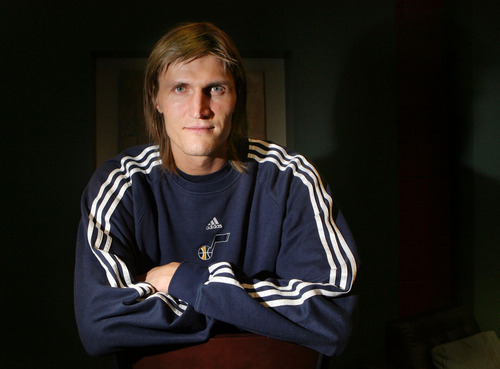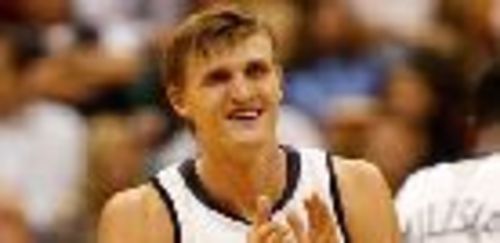This is an archived article that was published on sltrib.com in 2011, and information in the article may be outdated. It is provided only for personal research purposes and may not be reprinted.
Andrei Kirilenko's Jazz era ended strangely, like something out of those Russian spy novels he liked to read in the locker room prior to games.
The team signed free-agent forward Josh Howard this past weekend, implicitly canceling any plans to bring back Kirilenko for an 11th season in his only NBA home. There would be no announcement, no transaction, just a mysterious exit that resembles the way he unobtrusively dressed and hustled out of arenas after games.
Kirilenko is playing professionally at home in Moscow, to be pried away only by the kind of contract that was not sensible for the Jazz to offer him. He'll be remembered as a player who ranks high on several of the franchise's all-time statistical lists, but with a legacy spoiled by too much money and not enough fulfilled promise.
That maximum contract clouds every evaluation of Kirilenko's career; how could it not? Maybe getting paid $17.8 million last season was not his fault, but this organization and this market rightfully expected much more in return.
So in acknowledging A.K. as one of the top dozen players in franchise history, I'm labeling him a failure, in this sense: With his multiple talents, he was good enough to have No. 47 someday hang from the rafters. That won't happen. That's his fault.
And that's too bad. "So many good memories here," Kirilenko said in April, the day after the Jazz's season ended. "Ten years, you don't want to throw it out so quick."
He's right. Jazz fans will remember the dynamic, refreshing player, the All-Star who led a 2003-04 team with an Opening Night lineup of Matt Harpring, Greg Ostertag, Carlos Arroyo and DeShawn Stevenson to a winning record. They'll view fondly a family man who was community minded, good hearted and well liked among his teammates.
Yet they'll also think, fairly or not, of a contract that weighed down the franchise and became rancid before its expiration date. While making $34.2 million — or, more starkly, about $200,000 a game — over the past two seasons, Kirilenko averaged 11.8 points and 4.8 rebounds, while missing 42 regular-season games with injuries and not appearing in any playoff victories.
The money itself was not the problem as much as the length of the contract. As we know now, the late Larry H. Miller unduly rewarded Kirilenko for being the best player on a mediocre team. Once the Jazz improved, bringing in Deron Williams, Carlos Boozer and Mehmet Okur, that became painfully obvious.
His own teammates eclipsed him. Yet it remains reasonable to have wanted much more from Kirilenko. The irony of his impact is his year-by-year stats were remarkably consistent lately. That's misleading, because within those seasons came the stretches of brilliance that served only to tease everyone.
Kirilenko was inconsistent, often injured and, of course, overpaid. That's not a good combination. Over the past seven seasons, beginning when he agreed to the big contract, he missed nearly one-fourth of the Jazz's games. That's about the same rate as Boozer, who was unmercifully booed throughout his return to EnergySolutions Arena with Chicago in February.
A.K. will be treated better, I'm sure, if he ever comes back with New Jersey or another NBA team. In Jazz history, he ultimately ends up being comparable to Thurl Bailey — a good player, for a long time, just not meriting an enduring honor such as having his jersey retired.
Now, it's unlikely that anyone will actually wear No. 47 again, because it's a weird number. That's Kirilenko's legacy: There will never be another player like him around here. Yet A.K. did not truly become what he could have, either.
He may have signed the franchise's first max contract, but his potential? Never maximized.
Twitter: @tribkurt





